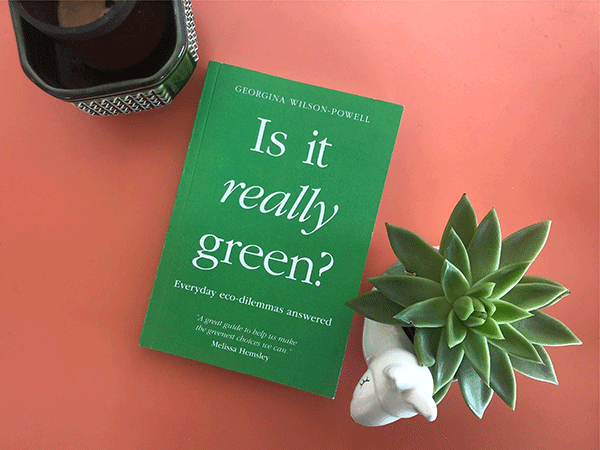Let’s get this straight from the off. I’m like you. As much as I wish that I grew up on an organic farm, growing veg, I didn’t. I had the normal childhood of a kid born in the ‘80s, replete with microwave chips, plastic-filled parties, and high-street fashion. No one ever gave a thought to what happened to the vast amount we consumed, day in, day out, beyond the bin.
When I was a teenager, most mainstream environmental campaigns focused on acid rain and saving the rainforests. “Global warming” felt theoretical at best; someone else’s problem at worst. The trouble is it’s not either of those. It’s real, and it’s here, affecting us through extreme weather events whether we care to acknowledge it or not. Sticking our fingers in our ears isn’t an option: we all have a part to play.
While the Covid-19 pandemic has been a wake-up call for some, making us more thoughtful about what we buy, who we buy it from, and whether we need to buy at all, overconsumption remains our society’s overriding issue.
Our consumer power and desire for stuff, experiences, and pleasure enable corporations to continue abusing the planet’s resources, with disastrous results.
This book covers eco-dilemmas that I, and friends, colleagues and readers, have come up against in day-to-day life. Faced with confusing and often contradictory advice, it’s easy to shrug and do nothing. Most of us are guilty; me included. That’s the behaviour we need to change. I’ve tried to find the greenest, simplest solution in each case, or, if that is not possible, I’ve explained why.
Entire books could be written about each of the issues I touch on, but I wanted this to be dip-in-able, and to give you some straightforward tools to make changes at home, at work, and in your social networks; it’s our everyday behaviours that we need to adapt.
What’s the environmental impact of processed foods?
A Western diet, heavy in processed food and snacks, puts more pressure not only on our own health but also on that of our planet.
Did you know? The average person in the UK receives 56 per cent of their daily calorie intake from ultraprocessed foods.
The biggest environmental issue associated with processed foods is the mass production of the ingredients most commonly used in them, including wheat and maize. These are grown industrially as monocrops, damaging biodiversity and contributing greatly to agricultural pollution.
Whereas small-scale, organic, and sustainable farming works with nature to ensure the soil remains healthy, industrial farming does the opposite. It pushes land and livestock as hard as possible for short-term profit at the expense of the environment.

Soil health might not sound exciting, but it is fundamental to a habitable world. In many places, soil is poor in quality: depleted by overuse and spoiled by having been soaked in chemicals. Large-scale farming has decimated everything from the essential invertebrates and microbes in healthy soil to our ancient forests and wildlife ecosystems. The chemical run-off from fields has created “dead zones” in our oceans, where a lack of oxygen means nothing can live.
Another major problem is the tendency for processed foods to have long supply chains, resulting in food waste and plastic over-use, which have been identified as industry-wide issues.
The United Nations has found that farms, manufacturers, and consumer-facing businesses are responsible for 58 per cent of all food waste.
All of that is quite overwhelming when you just want a packet of crisps. But you can make your diet greener:
- Avoid “ultra-processed” foods, such as unhealthy snacks, sugary breakfast cereals, and ready-meals.
- Buy “raw”, “whole”, or organic ingredients when possible.
- Embrace cooking from scratch; the satisfaction makes the extra work worthwhile. You’ll be helping to reduce food waste (who wastes homemade cake?), cutting back on plastic packaging, and not giving your money to the processed-foods business.
Is it really Green? (DK, £12) by Georgina Wilson-Powell, is out now.












I cook from scratch as much as possible. I cannot afford to buy everything I need as organic produce but try to be as green as I can. There needs to be more information on what pesticides and fertilisers have been used on the fruit and veg we buy.
Tolerable compromise under pressure is about intelligent choices and awareness. Where I can I use my pressure cooker to cut down fossil fuel gas use, as the house had a gas hob when we came. If time is short [many hospital appts for my OH etc] I will put on the electric oven to make a one-dish meal, eg yesterday’s almost -all-Riverford one. Oiled a lasagne-type dish, added very chunky-cut courgette, sweet potato and onions, fingers of celeriac [local shop], seasoned, added a little home-made stock and put chicken wings skin-down on top. Flipped the chicken to brown part-way through, whole meal straight to plate, no pans to wash, dish into dishwasher. That is always run overnight on economy 7 and jam-packed. Splosh dishwasher tablets pretty eco too.
Enjoy! [we did!]
It really should be a requirement for all manufactured food to be honest about what is in the food. For example bread which is not organic: the wheat will have been sprayed with glysophate prior to harvesting, and a certain amount will end up in the bread. So a notice should be put with the product saying contains a small percentage of glysophate. Another example would be preservatives. People need to know about the poisons in order to make personal choices whether they accept it or not.